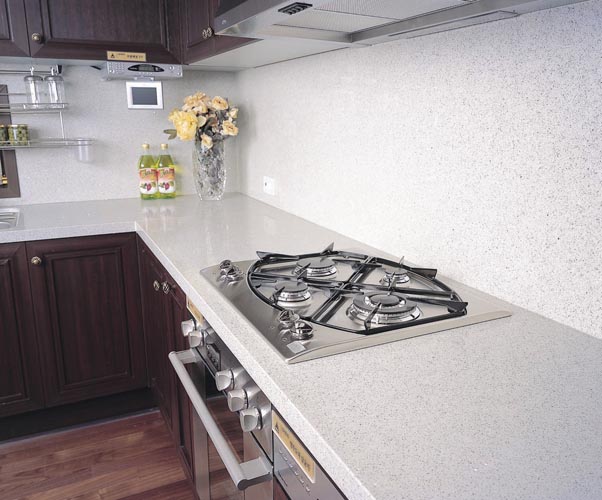Are Your Kitchen Counters "Hot Zones" for E. Coli? Studies find certain countertops can harbor dangerous bacteria

|
Did you know that your kitchen actually contains more bacteria than any other room in your home and the type of countertops you have may be making matters worse? Recent studies have found that porous material countertops can harbor dangerous bacteria, such as E. coli.
A recent University of Arizona at Tucson study identified the kitchen as the most germ-contaminated area in the home. The study reported that countertops are one of five key "hot zones," or sites with the highest bacteria counts. These hot zones can spread infections when germs are transferred from a contaminated item (your kitchen counter) to your hands to your body.
A second study conducted by the Hospitality Institute of Technology and Management (HITM) revealed that nonporous surfaces, such stainless steel countertops or other NSF 51 certified material, such as quartz, are least likely to harbor dangerous bacteria, such as E. coli, when compared to other popular household countertop materials.
The study highlighted the fact that consumers need to consider wear-and-tear when selecting a countertop surface. After a few years, most porous surfaces, such as granite, laminate, marble, wood, concrete, tile, and limestone wear down; lose their protective coating, scratch, and warp -- all decreasing the ability to be effectively cleaned and sanitized.
With stainless steel being very limited as a household countertop solution, other nonporous materials such as quartz are becoming more and more popular with consumers as they try to combine healthier choices with the latest designs for their homes.
"Quartz surfaces are growing in popularity because although they have the beautiful appearance of natural stone, unlike granite, these surfaces never need to be sealed," explained Mark Hanna, President of Leeza Distribution Inc., one of North America's leading distributors of HanStone Fine Quartz Surfaces.
That's because Quartz countertops, such as HanStone are not only highly scratch resistant, but also nonporous so they don't require sealing. As a result, they show very little wear, will not promote the growth of mold, mildew or bacteria can be easily maintained for years.
Unlike stainless steel, however, HanStone quartz surfaces bring strength, resilience and extraordinary beauty and elegance to your kitchen decor with its 32 dramatic colors, vibrant patterns and luxurious sheen.
Quartz surfaces are so hygienic most brands are approved surfaces for food preparation by the National Sanitation Foundation, with the NSF 51 certification in the United States.
One popular brand, Silestone quartz, is taking it one step further as the only quartz countertop available to offer built-in Microban (pesticide) antimicrobial protection. However, many consumers view this additional pesticide protection as more of a health risk than a benefit.
"We've had calls from people who actually cancelled their quartz countertop orders from another company and contacted our dealers once they discovered the countertops they selected contained Microban," said Hanna, whose HanStone Quartz surfaces are accredited with NSF 51 certification, as well as Greenguard environmental certification for low emitting products.
As a healthy and environmentally friendly choice, HanStone Quartz countertops can be used in virtually any indoor surface application in kitchens and bathrooms, including floors, countertops, island tops and backsplashes. More information on fine quartz surfaces is available at leezadistribution.com.







